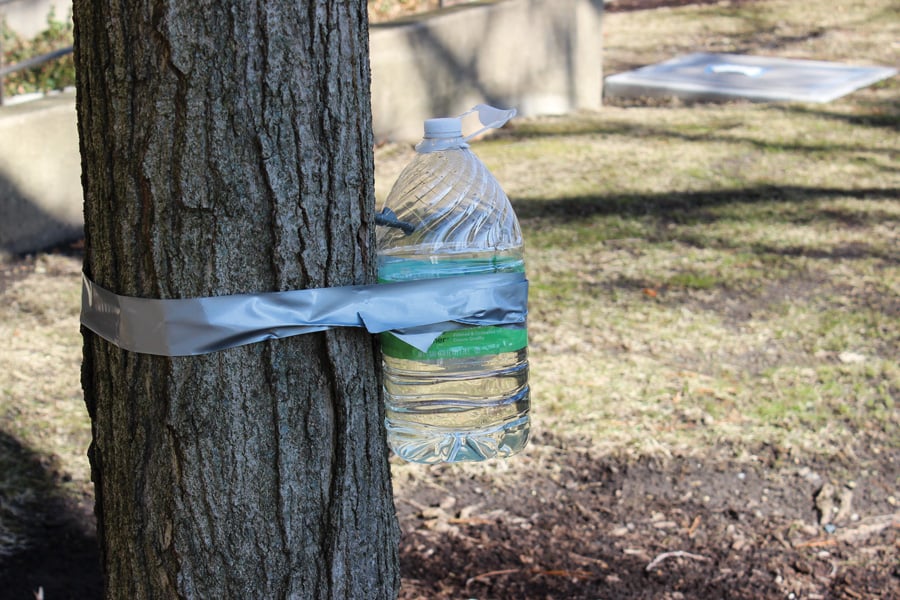Tapping into climate change: How one professor is teaching climate change through maple syrup production
Connie Deng/ The Daily Northwestern
Bottle taped to a tree to collect sap for Prof. Eli Suzukovich’s “Maple Syrup and Climate Change.”
February 23, 2020
Almost overnight, taps and plastic bottles were attached to dozens of trees across campus, collecting gallons of sap.
Environmental policy and culture prof. Eli Suzukovich began this project in 2015, which has since evolved into a Winter Quarter course called “Maple Syrup and Climate Change.” It studies the local impact of climate change through sap collection and analysis.
The objective is to enrich students on how climate change has impacted the length of maple syrup production and tapping season and therefore limited the timeframe.
A member of the Little Shell Band of Chippewa-Cree tribe and the Krajina Serb ethnic group, Suzukovich said he brings an indigenous perspective to environmental studies at Northwestern. His course, he said, examines changes in the demand of maple syrup in relation to the Evanston micro-climate and their impact on local indigenous communities.
For the project, Suzukovich divides his students into groups that tap trees across campus, periodically collect sap and finally cook the sap into maple syrup that the students can consume. He challenges students to get out of their comfort zone and learn in an outdoor environment, he said. The last few weeks of the course are devoted to outdoor data collection of sap flow rates, sugar ratios, soil quality and other environmental variables.
“The students are producing yearly data on tree activity in relation to climate,” Suzukovich said. “So we’re actually building some baseline data.”
McCormick senior Jared Colin said this course was different than any he had previously taken because the structure of the course changes week to week. Some days are devoted to learning about indigenous environmental history and wildlife, while others are spent interacting with nature, he said.
Colin said his favorite part about the class has been tapping the trees and collecting the sap. Maple syrup is typically a product you associate with being produced in places like Canada or Vermont, not the Chicago area, which is why he said the class was such an interesting concept. He said Suzukovich’s focus on integrating indigenous cultures into the coursework has been one of the most engaging aspects.
“It’s cold but it’s enjoyable,” Colin said. “Dr. Suzukovich is very knowledgeable about Northwestern’s campus and about the wildlife and nature that is on it.”
Weinberg sophomore Nancy Iden said she was interested in taking the class because of how hands-on the coursework and projects would be.
Iden said the course has demonstrated the effects of climate change in a way that’s tangible and less existential than it’s typically taught. Over the weekend, she said she traveled home to cook eight or nine-gallon bags full of frozen sap and returned to campus with a small mason jar of maple syrup.
“It seemed like a way to gain a better understanding of the material because you’re actually going out into nature and working with it as opposed to just reading about it,” Iden said.
Email: [email protected]
Twitter: @isabellesarraf
Related Stories:
– Evanston’s Democratic Party discusses climate change education
– Evanston students and residents join protests worldwide to demand equitable action on climate change
– Report warns of climate change-related impacts on Great Lakes


